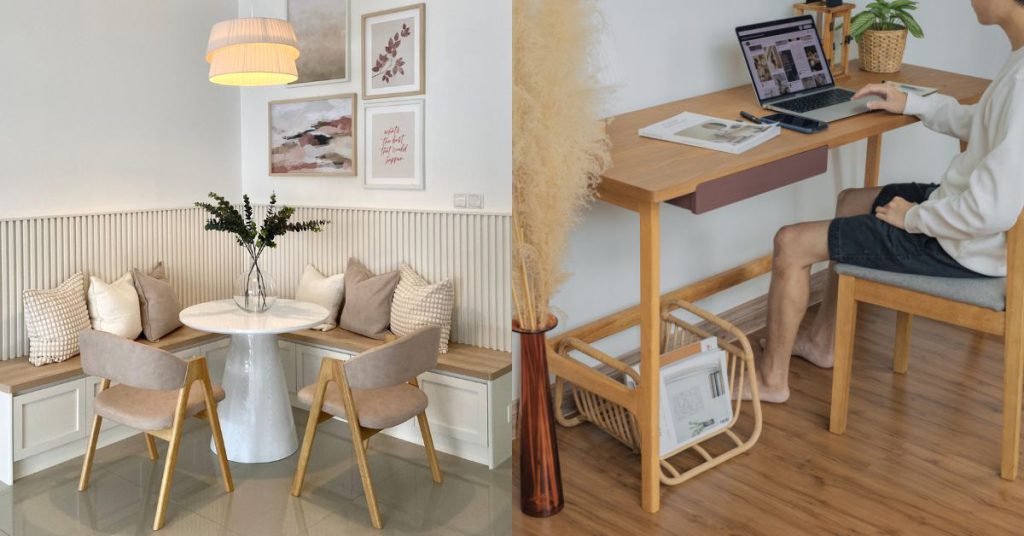When Jin and Ann Sze, a husband-and-wife duo, ventured into the Malaysian furniture industry together, they identified a gap.
Ann, with her background in marketing and experience in industries like fashion and fast-moving consumer goods, joined her husband Jin’s family business six years ago, which specialised in exporting high-quality wooden furniture overseas.
“When I first joined my husband’s family business, I was amazed to learn that Malaysia is one of the top 10 furniture exporters in the world,” Ann told Vulcan Post.
Despite this impressive manufacturing strength though, many Malaysian furniture brands remained relatively unknown locally.

Equipped with their respective skill sets, they saw an opportunity to revolutionise how Malaysians experience furniture shopping, leading to the birth of Neo Livin in 2021. It’s a direct-to-consumer (DTC) platform designed to connect high-quality, export-ready furniture with local customers.
“We saw the potential to support other furniture manufacturers by building a platform that not only showcases their products but does so in a way that reaches more people,” Ann explained.
But, how exactly are they revolutionising furniture shopping for Malaysian consumers and manufacturers?
The pivot to community showrooms
Ann and Jin quickly noticed the inefficiencies of the traditional retail model, where brick-and-mortar stores come with significant operational costs and space limitations. Retailers often impose hefty markups, making it difficult for consumers to access high-quality furniture at reasonable prices.
Neo Livin’s solution was simple: start entirely online. But as enquiries for physical showrooms grew, particularly after the Movement Control Order (MCO), Ann and Jin began exploring more innovative ways to meet customer demand without the overhead of maintaining a dedicated retail space.
The concept of community showrooms was born, with Neo Livin partnering with cafes, coworking spaces, and Airbnbs.
Rather than sterile, static showrooms, the furniture is displayed in real-life settings, allowing people to see how the pieces might work in their own homes or offices.
“Imagine shopping for a new dining table while enjoying a cup of coffee in a beautifully decorated cafe,” Ann remarked. “It makes the experience more personal and enjoyable.”
They have collaborated with local businesses such as Kubis & Kale, Pucks Coffee, and MyStartr for their community showroom concept.
“The beauty of the community showroom model is that it benefits both parties,” Ann shared. “The cafes and spaces get more foot traffic and commissions, while we reduce costs and provide a more immersive shopping experience for customers.”
“We select community showrooms that align with our brand values and aesthetics, ensuring that customers are getting the best possible representation of our products.”
Sustainability and scalability at the core
Neo Livin’s community showroom model is also designed with sustainability in mind. By sharing space with local businesses rather than maintaining large, energy-intensive showrooms, Neo Livin reduces its environmental impact and carbon footprint.
Moreover, this model allows for scalability. With over 5,000 SKUs in their product line, maintaining a traditional showroom would be impractical.
Instead, Neo Livin’s network of community showrooms can grow organically, expanding into new markets without the need for significant physical infrastructure.
“We’re able to continuously expand our product offering while keeping our operational costs low,” Ann noted.
Building trust and overcoming challenges
Launching Neo Livin wasn’t without its challenges. As a new platform, Ann and Jin had to work hard to build trust with both customers and manufacturers.
“Convincing high-quality manufacturers to join our platform took time,” Ann admitted. “We had to prove that we could offer them value in terms of reach and sales potential.”
Neo Livin’s reputation has grown through word of mouth, excellent customer service, and a strong brand identity, she said.
Financially, bootstrapping the business also presented obstacles. However, Ann and Jin focused on cost-effective strategies like digital marketing and community partnerships, maximising their reach while keeping expenses in check.
“To accelerate our growth and expand our reach, we are actively seeking strategic investors who can contribute capital, industry expertise, and valuable connections,” Ann shared.
As of the time of writing, Neo Livin has generated RM3 million in cumulative revenue, primarily driven by their B2C segment.
“In 2023, our revenue reached approximately RM1 million, and we are targeting RM3 million for 2024,” she said.
The future of furniture shopping
As Neo Livin looks to the future, Ann and Jin have ambitious plans. They aim to expand their community showroom concept internationally, targeting key markets like Singapore, Australia, and the US.
“We envision Neo Livin becoming a global brand, promoting the best of Malaysian-made furniture to the world,” she shared.
In the coming years, they plan to onboard over 100 local manufacturers, giving them a platform to showcase their products globally.
Neo Livin also aims to partner with industries like interior design and real estate to create a comprehensive ecosystem where customers can experience and purchase furniture in various contexts.
By combining the convenience of online shopping with the immersive experience of physical showrooms, Neo Livin is transforming the furniture shopping experience for the better.
- You can learn more about Neo Livin here.
- Read other articles we’ve written about Malaysian startups here.
Featured Image Credit: Neo Livin